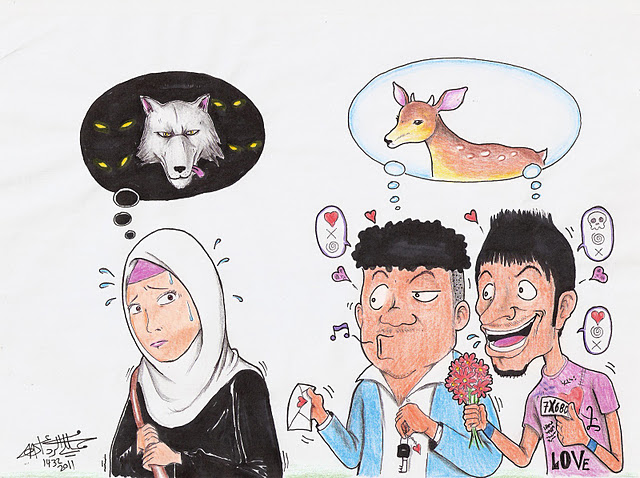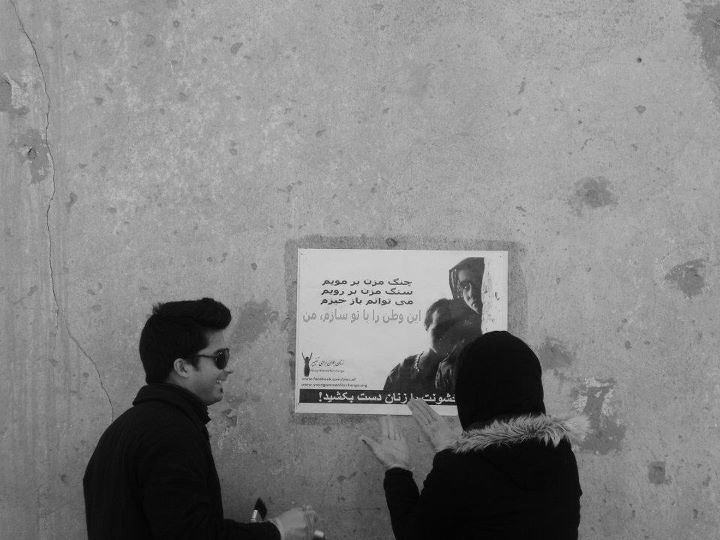In Yemen more than 90 percent of women experience street harassment. Last year Ghaidaa Al Absi launched The Safe Streets campaign to address the problem. She created a website, using Ushahidi, to track street harassment in Yemen and recently she hosted an exhibition of local artists’ work on the topic. I’ll post an interview with her soon, in the meantime, view images from the exhibition. Here’s one of them.  This image reminds me of something an attendee said during the Q&A at my talk last February at James Madison University. She said, “Street harassment teaches women that they are prey and that it’s safer to stick with the herd.” It’s sad but true how, because of street harassment and sexual violence, women often feel unsafe in public unless they are in a group. Even in Yemen, where women are very modestly dressed and veiled, they still face street harassment and are the prey with street harassers as the predators. Street harassment is not about what we wear or how we look, it’s about disrespect for women.
This image reminds me of something an attendee said during the Q&A at my talk last February at James Madison University. She said, “Street harassment teaches women that they are prey and that it’s safer to stick with the herd.” It’s sad but true how, because of street harassment and sexual violence, women often feel unsafe in public unless they are in a group. Even in Yemen, where women are very modestly dressed and veiled, they still face street harassment and are the prey with street harassers as the predators. Street harassment is not about what we wear or how we look, it’s about disrespect for women.
Archives for December 2011
ultra-Orthodox Jewish men call 8-year-old girl “whore” as she walks to school
“A shy 8-year-old schoolgirl has unwittingly found herself on the front line of Israel’s latest religious war.
Naama Margolese is a ponytailed, bespectacled second-grader who is afraid of walking to her religious Jewish girls school for fear of ultra-Orthodox extremists who have spat on her and called her a whore for dressing “immodestly.“
Her plight has drawn new attention to the simmering issue of religious coercion in Israel, and the increasing brazenness of extremists in the insular ultra-Orthodox Jewish community.
“When I walk to school in the morning I used to get a tummy ache because I was so scared … that they were going to stand and start yelling and spitting,” the pale, blue-eyed girl said softly in an interview with The Associated Press Monday. “They were scary. They don’t want us to go to the school.”
The girls school that Naama attends in the city of Beit Shemesh, to the west of Jerusalem, is on the border between an ultra-Orthodox neighborhood and a community of modern Orthodox Jewish residents, many of them American immigrants.
The ultra-Orthodox consider the school, which moved to its present site at the beginning of the school year, an encroachment on their territory. Dozens of black-hatted men jeer and physically accost the girls almost daily, claiming their very presence is a provocation.
Beit Shemesh has long experienced friction between the ultra-Orthodox, who make up about half the city’s population, and other residents. And residents say the attacks at the girls’ school, attended by about 400 students, have been going on for months. Last week, after a local TV channel reported about the school and interviewed Naama’s family, a national uproar ensued.
….
Hadassa Margolese, Naama’s 30-year-old Chicago-born mother, an Orthodox Jew who covers her hair and wears long sleeves and a long skirt, says, “It shouldn’t matter what I look like. Someone should be allowed to walk around in sleeveless shirts and pants and not be harassed.”
Read the full CBS news article and read more in the Jerusalem Post and New York Times.
I applaud Naama and her mother for speaking out against the harassers and against street harassment in general. I hate that harassment happens period but I am OUTRAGED when it happens to kids and teenagers, especially when the harassers are grown men. They are bullies.
I also applaud the police for taking action:
“Police Commissioner Insp.-Gen. Yohanan Danino ordered his commanders and officers to enforce a zero-tolerance policy toward discrimination against women. According to guidelines sent by Danino to police commanders, any form of this discrimination must be treated as a criminal offense or a public disorder incident. Danino accompanied the orders with a condemnation of the phenomenon, describing “any attempt to harm the rights of women” as unacceptable.”
This story illustrates how street harassment can intersect with other forms of discrimination or conflict, such as religion. It also shows how the targets and purpose of the harassment are the same worldwide: the harassers target girls or women in public places just because they are girls or women in public places and then they shame them/threaten them/scaring them/humiliate them.
Thanks to the large number of harassers worldwide, public places are less safe and less welcoming for girls and women everywhere, including for 8-year-old girls. That is not okay.
Is street harassment starting before puberty really the future we want for the next generation of girls?
If we don’t do something, that is their future.
Hollaback Israel is fighting street harassment in Israel. Find ideas for how you can help end street harassment in your community. Join us in speaking out against street harassment during March 18-24, 2012, International Anti-Street Harassment Week.
“Why you teasing me like that?”
I was walking to a CVS in my neighborhood and walked past a man who looked unkempt and was leaning on a railing next to the store. I avoided eye contact and as I walked towards him he yelled, “Why you teasing me like that?” “Why you teasing me like that?” And he shook his entire body (like he was cold) to illustrate his point. Mind you, I was wearing a black winter coat, a sweatshirt, and jeans. This man just wanted to harass me for no reason.
I just ignored him and did not respond. Minutes later when I exited the store, I went the opposite way from which I had came in order to avoid the man. Even then, I knew he was waiting for me to come out, because he called to me even as I was walking in the opposite direction.
I was so frustrated that I went online looking for ways to deal to street harassment and I found this website. I’ve been street harassed numerous times and I’m never quite sure how to respond for fear that the person might retaliate. However after reading some stories on the site, I’ll try to use some of the suggestions I saw on here.
No woman deserves to be harassed under any circumstance.
– Anonymous
Location: 4555 Wisconsin Avenue NW Washington, DC 20016
Share your street harassment story today and help raise awareness about the problem.
Find suggestions for what YOU can do about this human rights issue.
700 anti-violence posters pasted throughout Kabul, Afghanistan
 These two blog entries are cross-posted with permission from the blog of Young Women for Change, a women’s rights group in Afghanistan:
These two blog entries are cross-posted with permission from the blog of Young Women for Change, a women’s rights group in Afghanistan:
Posting Our Voices on the City Walls
Friday, December 23, 2011, Young Women for Change (YWC) filled the streets of Kabul with posters about women rights messages. It was another day of history, for the first time Kabul streets have seen women rights posters posted by Afghan men and women. We started poster advocacy from our Facebook page and website. Later, we decided to post it on the Kabul streets walls so it reaches every Afghan that crosses those streets.
I, like any other YWC member, was nervous about it, but as we moved through the city I felt stronger. It was rewarding when school students and every person on the street would read it, if they couldn’t read it, they would ask others to read it for them. After reading poster on the wall people would ask us to post posters on their cars.
I felt like my heart was going to melt down when we posted a poster and a shopkeeper who was there watching us posted it, couldn’t read it, and asked other person to read it. When he learned what the poster said, he started fixing the poster and glued it harder on the wall. Two policemen walked to the other side of the road to read our posters.
Others thought we were working for money and belonged to a foreign organization, without knowing the fact that we are an Afghan group and this project is funded by individual Afghans. Maybe there are not to blame. We, youth, have not had much of ground level work and in the media, youth complain about what the government or others have not done instead of talking about what we can do.
The poster day was an example of how and with whom YWC wants to work. We want to reach every Afghan individually and work with them to change the stereotypes and bring the positive change to our country, ourselves. It is time we realized our responsibilities.
— By Anita Hadiary, YWC Co-Founder, 20
One Step Closer
The poster initiative began on Young Women for Change’s Facebook pages. Every week, we would post a poster about violence, street harassment or other forms of gender-based discrimination online. There would be debates on them. Many times, followers of our page would get into heated discussions with other Afghans who were favorable towards violence against women or practiced victim-blaming. The debates would reach to one hundred or more comments and tens of people would share the posters to their own Facebook pages or groups. It was striking how there were people among the so-called “educated people,” who had access to internet, and argued that it was somehow okay to beat a woman or disrespect her on the pretext of her clothing. At one point, a Kabul University student wrote, “my mother has her own place, but if my wife ever dares to disobey me, she will not be safe in my house.” Shocked, we shared the comment with others, and many women and men raised their voices to condemn it.
The amount of ignorance and misogyny we witnessed among the small percentage of people who had access to the internet and claimed to be intellectuals and educated, led us to believe in the need to do more advocacy in Kabul. To do this, we used our own money to print out posters, created some glue using ground wood and walked to the streets to post our views on the walls of Kabul city.
Today, about twenty five people, men and women, got together to glue 700 posters about violence against women and education for women on their city’s walls. Members of Young Women for Change and YWC Male Advocacy team led the initiative. A few members of other youth organizations, like Hadia and Afghan Intellectuals Network, also joined as we exited our modest office at around 11:00am. Four people had volunteered to give us their cars for transportation during the poster event. Ice was still shinning underneath our feet as we walked to the cars, divided up posters, brushes and glue among the groups and drove towards Sakhi Shrine in Karte Sakhi.
It was crowded there. Shopkeepers, laborer children who attempted to sell us gum or Bolany, a delicious Afghan dumpling, and women who had visited the shrine gathered around us as we organized and decided which areas to cover. We divided into four groups and each group hit one corner. Soon, one or two posters could be seen at the beginning of every street.
My team and I went to the front door of the shrine. We approached a shopkeeper to ask permission to post one of the posters on his wall.
– “What is this?” he asked me.
– “It is a poster about violence against women.”
– “I am against women. Don’t put this one on my walls. A man is a man. If he is angry, he beats. That is what men do. I am against this,” he said angrily.
I smiled with sadness and tried to convince him to give me permission to at-least glue the poster about education to his wall. I kept forcing myself to smile at him. My mother had warned me earlier in the day, that during the poster project I should keep my cool. “If you laugh about things, they will laugh too and eventually they will agree. If you are serious, they get angry more quickly thinking you are criticizing them,” she had said.
-“Let me study. Only one out of ten Afghan girls graduates high school,” I read the poster to him.
-“It is still about women,” he said.
– “It is about little girls. They need education otherwise our country will never be build,” I said with a smile. He shook his head reluctantly. My colleagues and I glued the poster to his wall.
Often, many we meet tell us we should do this sort of thing out of Kabul because people in Kabul are more educated and aware, but our conversations and encounters usually prove this statement wrong. Even in Kabul, the level of acceptance of a woman as an equal human is low. This encounter and many others during the day made us more confident that what we were doing is essential.
We went to Karte Char, Makrooyan, Taimani, Shahre Naw, Qalaye Fatullah and Khushal Khan Meena and we met many men and women who showed interest in our work, in addition to the ones who would oppose us. In Qalaye Fatullah, several laborer children gathered around a poster about early marriage and tried to read the poster to each other. Then, they ran over to the cars they were washing and told more kids about the posters. An old illiterate man, who polished shoes in Taimani, asked his friend to read it to him. Later, we saw him fixing the glue to save the poster from falling to the ground.
From the children who practiced reading with our posters, to older men and women who helped us and even to the men who argued with us and said that they did not want the posters, the hundreds of people we met and spoke with on Friday motivated us and gave us more energy. The reality that twenty-five Afghan women and men sacrificed their Friday, a weekend day, donated their money and resources and even endangered their safety to raise awareness among their people was another example of how Young Women for Change inspires Afghan youth to unite for creating a better Afghanistan.
– By Noorjahan Akbar, YWC Co-Founder, 20


